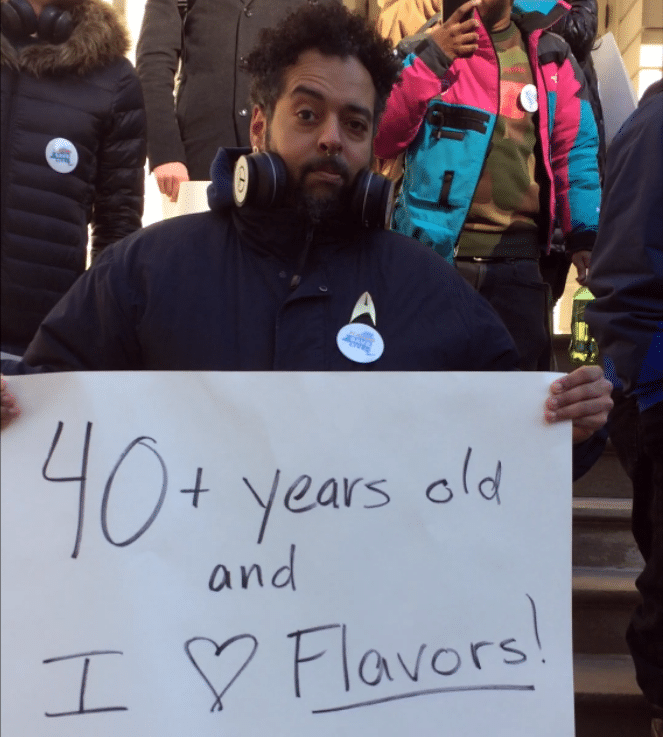New York City is about to make a decision that will resonate far beyond the five boroughs. In January, City Council Health Chair Mark Levine introduced Ordinance 1362, which would prohibit the sale of flavored e-cigarettes in the city.
“Vaping has reached epidemic levels among teens, with life-long implications for young people who become addicted to nicotine,” said Levine. “One of the tools the industry has used to draw in teenagers is candy flavors like chocolate mint, blueberry, or cherry crush. These flavored smoking products disproportionally attract younger consumers, which is why New York City long-ago banned flavored tobacco. It’s time we did the same for e-cigarettes.”
His proposed legislation would prohibit vape shops and other businesses from selling all vaping products except those that are tobacco-flavored or flavorless.
The ban is opposed by the American Vaping Association (AVA) and the New York State Vapor Association (NYSVA). “This proposal represents an existential threat to the future of all 70-plus vape shops in New York City,” said Greg Conley, the president of AVA, a nonprofit advocacy group*. “Over 90 percent of the flavors sold in vape shops will be banned under this law. There is no hope for these stores to survive if this bill passes.”
A major recent study showed that smokers are almost twice as likely to succeed in quitting if they switch to e-cigarettes compared with if they use nicotine patches or gums.
Tobacco harm reduction advocates say the ban on sales at convenience stores and bodegas would eliminate choices in the locations where smokers are most likely to encounter vapes, reducing the likelihood of purchases that could lead to long-term smoking cessation. Cigarettes will still be available for purchase at these locations.
“We know from several studies that adults using fruit and sweet flavors are more likely to be smoke-free as compared to those using tobacco flavors.”
Conley also notes the importance of flavors in smokers successfully switching to vaping. “We know from several studies that adults using fruit and sweet flavors are more likely to be smoke-free as compared to those using tobacco flavors,” he said. “While some ex-smokers enjoy tobacco flavors, the majority of adult ex-smokers have no desire to be reminded of the taste of a cigarette.”
Dr. David Abrams, professor of Social and Behavioral Sciences at the NYU College of Global Public Health and tobacco harm reduction researcher, also made this point during a hearing on the proposed flavor ban at City Hall on January 30.
He stated that ex-smokers who use tobacco-flavored vaping products are more likely to relapse than those who use other flavors, because they are continually reminded of their original smoking experience. (Dr. Abrams’ primary testimony that day was also published in Filter).
Advocates on both sides packed the room at City Hall, and a rally to oppose the ban was held on the steps of the building prior to the hearing.
The procedure was surprising to those unfamiliar with such events. The hearing was presided over by Mark Levine himself, who began by emphasizing that youth vaping—rather than, as some would argue, deaths from cigarette smoking—should be the hearing’s primary concern. The first part of the hearing—encompassing almost three hours of testimony and dozens of speakers—was dominated by supporters of the proposed ban.
“I know how Juul messes with your brain.”
As well as Dr. Oxiris Barbot, commissioner of the New York City Department of Health and Mental Hygiene, and advocates like Matthew Myers, president of the Campaign for Tobacco-Free Kids, the hearing included a number of concerned mothers from Parents Against Vaping, together with their teenagers who had vaped or seen their peers vape. The teens described how widespread vaping had become among high-schoolers and some middle-schoolers. One boy told the hearing how he had started vaping, wished to quit, and struggled to do so.
“I know how Juul messes with your brain,” said one seventh-grade girl, who had seen others vape but not vaped herself. Levine described the teens’ testimony as the most powerful and important that the meeting would hear.
Tobacco harm reduction researchers and advocates, including Abrams and Conley, were later able to testify in opposition to the ban. Supporters broke into applause after Abrams’ testimony, and were reprimanded by Levine, who reminded the crowd that this was forbidden.
Spike Babaian, the owner of four vape shops in NYC and an expert in vaping products, stated that she has helped hundreds of adult smokers switch to vaping. She transitioned to vaping herself almost a decade ago. Babaian said of the pro-flavor-ban parent advocates, “I’m not sure they care about the science or the data. They care only about the optics and the image, which is why they bring their teenagers to hearings to say e-cigs are bad when the teens don’t know anything about e-cigs.”
“Parents were getting up there and saying it’s our fault in 21-and-older vape stores that their children bought e-cigs on the internet,” Babian told Filter. “We have strict ID policies at our stores. So it’s our fault that they didn’t parent their children to make sure they’re not purchasing e-cigs with their credit cards on the internet? And they want to close down every vape shop? That makes me furious.”
Babaian said that if the ban is passed, countless smokers will lose easy access to vaping products to help them quit smoking. She added that millions in public money would be allocated to enforcement of the flavor ban. In the case of cigarettes, which are highly taxed but not banned in New York, the state’s rate of illicit sales is estimated to be the highest in the nation, at 56.8 percent.
* The American Vaping Association has donated to The Influence Foundation, the nonprofit organization that operates Filter.
The photo shows a protester against the proposed ban at City Hall on January 30. Credit: Filter




